Hole in the Clouds
Feb 18, 2010

Fitzrovia is the London neighborhood that once surrounded the Fitzroy tavern, a long-gone, between-the-wars watering hole. Plenty of pubs remain, however, and for generations now, Fitzrovia might be best characterized as the part of town where famous writers and musicians go to drink: the long list is known to include George Orwell, Virginia Woolf, Dylan Thomas, Rimbaud, Verlaine, and more recently, Bob Dylan, Pink Floyd, and the fictional heroes of Saul Bellow.
cityscape
birdseye view
London
England
Feb 3, 2011
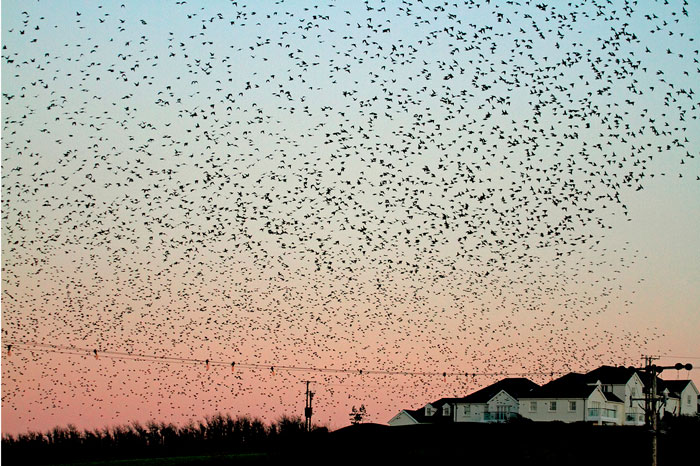 Those of us of a certain age take one look at what's going on here and think: things are about to get very bad. We know the scene is set in an isolated spot along the coast of northern California. But actually, the flocking here is on the coast of southwestern England, in Devon, where starlings fill the sky like this all winter long, and it's not a problem at all.
Those of us of a certain age take one look at what's going on here and think: things are about to get very bad. We know the scene is set in an isolated spot along the coast of northern California. But actually, the flocking here is on the coast of southwestern England, in Devon, where starlings fill the sky like this all winter long, and it's not a problem at all.
landscape
animals
England
Devon
starlings
Feb 11, 2011
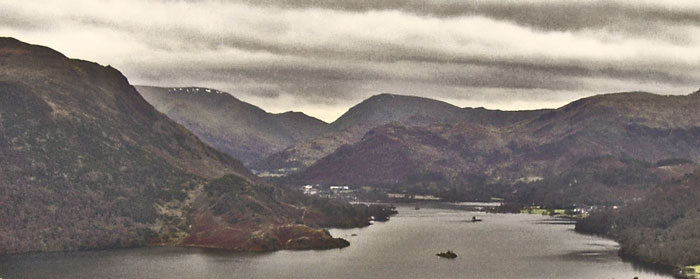 In 1930, a Lancashire stonemason's son named Alfred Wainwright glimpsed these fells, lakes, and vistas while out for a tromp with his cousin. He was smitten by the landscape and devoted the rest of his life to fellwalking and to recording his walks in a self-published seven-volume series of guidebooks. For thirteen years, he worked on his books, hand-lettering descriptions of the walks, and hand-drawing maps of the routes and sketches of the views. He wrote at night after coming home from work, averaging a page a night.
In 1930, a Lancashire stonemason's son named Alfred Wainwright glimpsed these fells, lakes, and vistas while out for a tromp with his cousin. He was smitten by the landscape and devoted the rest of his life to fellwalking and to recording his walks in a self-published seven-volume series of guidebooks. For thirteen years, he worked on his books, hand-lettering descriptions of the walks, and hand-drawing maps of the routes and sketches of the views. He wrote at night after coming home from work, averaging a page a night.
Stephen Ruffles, a baker and amateur photographer who in 2008 captured this scene of Ullswater, the second-largest lake in Wainwright's beloved Lakes District, is among untold thousands of fellwalkers inspired by the books. Like many others, Ruffles has set out to replicate all 214 of Wainwright's fellwalks; this picture was taken on walk 207. The weather was unpleasant, he noted, but still the walking was excellent.
England
Alfred Wainwright
fellwalking
Ullswater
Lake District
(Image credit: Steven Ruffles)
Aug 8, 2012
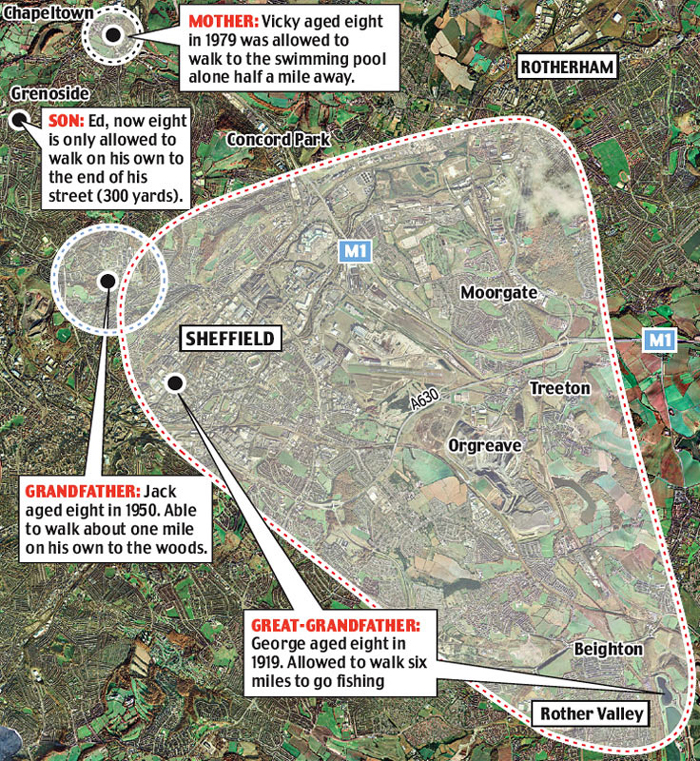 In 1919, when George Thomas was an eight-year-old growing up in the town of Sheffield in northern England, he and his brothers and friends felt they owned the streets of Sheffield and the fields and forests all around. Their parents didn't mind when they wandered off on adventures of their own devising; even at the young age of eight, he often walked six miles to a fishing pond.
In 1919, when George Thomas was an eight-year-old growing up in the town of Sheffield in northern England, he and his brothers and friends felt they owned the streets of Sheffield and the fields and forests all around. Their parents didn't mind when they wandered off on adventures of their own devising; even at the young age of eight, he often walked six miles to a fishing pond.
In 1950, when George Thomas's son-in-law Jack Hattersley was eight years old in Sheffield, children still routinely walked long distances from home unsupervised. Almost daily, Jack walked a mile to play with his friends (unsupervised) in the woods.
But by 1979, when Jack Hattersley's daughter Vicky was eight years old in Sheffield, children stuck closer to home. Vicky grew up in a suburban subdivision, which she never left except in cars driven by her parents or her friends' parents. Still, she was allowed to walk or ride her bike by herself as far as about half a mile through the neighborhood to her friends' homes or to the swimming pool. And like her father and grandfather, she walked to school every day.
By 2007, when Vicky's son Edward Grant turned eight, unscripted and unsupervised childhood wandering was a thing of the past. Ed has a bike, but to ride it he and his parents travel by car to safe bike paths. His mother drives him to school. He is allowed to walk by himself to the end of his block, about 300 yards, but his parents say he never wants to do that because no other children in the neighborhood are allowed out by themselves to play.
Like many eight-year-olds nowadays, Ed basically stays in his house except when his parents drive him somewhere. This is not a miserable situation for him; unlike his great-grandfather, whose childhood home was cramped and crowded and unadorned with childhood playthings, Ed has a room of his own at home, with plenty of toys and electronic diversions. Since he's never known the freedom to wander that was treasured by generations of children past, he doesn't seem to miss it.
His mother, grandfather, and great-grandfather mourn the loss for him. They are nostalgic for this aspect of their own childhoods. They suspect that some of the fears leading parents to keep children so entirely caged nowadays are overblown. But still, societal norms have become so fiercely hostile to the very idea of letting children loose that no challenge seems possible. It is their duty to keep Ed safe and supervised, even if the consequence is that his childhood is being spent in a gilded prison.
Wonder what will happen to Ed's children?
England
map
Sheffield
childhood
walking
social change
childrearing
(Image credit: Daily Mail; h/t: Frank Jacobs)
Mar 25, 2013
 Trees from above, waiting for the sun.
Trees from above, waiting for the sun.
birdseye view
winter
England
trees
aerial imagery
Queensbury
Great Britain
Nov 19, 2013
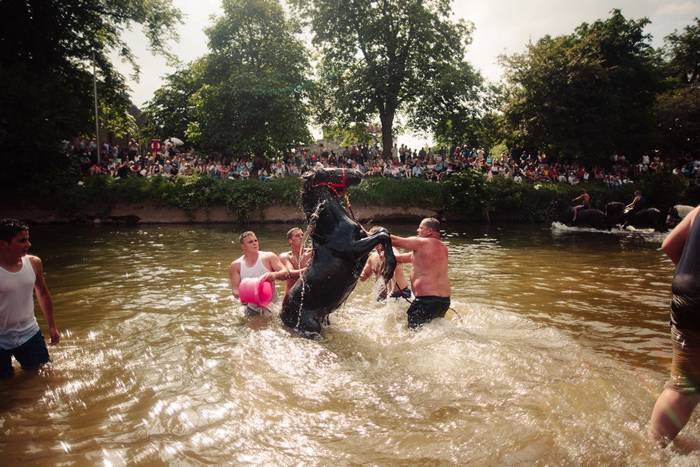 Horses are washed in the Eden River before being paraded through town for the Appleby Horse Fair last June.
Horses are washed in the Eden River before being paraded through town for the Appleby Horse Fair last June.
The annual fair is Europe's largest gathering of gypsies and travellers. It is also one of the oldest fairs in England, occurring every June since 1685, when King James II granted a royal charter permitting a horse fair "near to the River Eden" in Cumbria; an estimated 10,000 English and Welsh gypsies, Irish travellers, and Scottish gypsy/travellers assemble for the fair to buy and sell horses and catch up with friends and relatives.
In recent years, the gypsies are joined by about 30,000 non-travellers (muggles?) who travel to Appleby to see the gypsies and their horses.
"Appleby Horse Fair is not an organised event," warns a local government publication aimed at potential tourists. "There is no set programme for anything happening. The horses are washed and trotted up and down the flashing lane.
"There is a market on Jimmy Winter's field selling a variety of goods–some traditional to the gypsy/travelling community–and other. To arrange to sell on that field, please contact Jimmy Winter....
"There is no horse auction. Sale arrangements are made buyer to seller for cash. The price will usually include extra for Luck Money."
Tourists are also warned that accommodations in the vicinity during fair week will be "rarer than hen's teeth. If you have a tent, however, you may be able to camp at Holme Farm Field. Speak to Mrs. Bousfield."
landscape
animals
England
horses
festival
Eden River
Cumbria
Appleby
(Image credit: Kristian Helgesen)
May 27, 2014
 Photographer Leon S-D describes this array of images as follows:
Photographer Leon S-D describes this array of images as follows:
One of the many shops which have been left closed and abandoned as part of the East Riding County Council's Regeneration Scheme, Hilderthorpe Road, East Yorkshire, England, 2008 to 2014.
streetscape
abandoned
England
windows
East Yorkshire
(Image credit: Leon S-D)
Sep 16, 2014
 Blacksmith Michael Hart of Horsmonden, Kent, U.K., beats an old chainsaw chain into a new knife.
Blacksmith Michael Hart of Horsmonden, Kent, U.K., beats an old chainsaw chain into a new knife.
Hart tries to keep the fire in his forge at about 1200 degrees Fahrenheit. Each time he pulls his work out of the fire, it glows white-hot and his first hammer blow releases a shower of sparks. Succeeding blows do less glitzy work.
England
work
fire
Michael Hart
Kent
Horsmonden
blacksmith
(Image credit: Tim Allen from timallenphoto.co.uk)
Feb 9, 2017

In 1986, the stairwell in this parking garage that connected the rooftop parking deck with the shopping streets alongside the garage was permanently locked. The problem, according to the St. Helens Reporter, the local newspaper, was "continued vandalism and anti-social behaviour."
Twenty years later, in 2006, the new staircase shown above was opened, spiraling around a polished steel "millennium needle" standing 20 meters high. The Reporter called it a "pole." The project, according to the Reporter, added an expensive "feature" of questionable value to the downtown area.
Downtown St. Helens, in the north of England east of Liverpool, hadn't had much in the way of expensive features for many years. A bustling mining and manufacturing center in the nineteenth century, it was rusting away of late, with only one factory remaining and a population of about 100,000. The whole region was depressed.
Google "St. Helens needle" and you come up with lots of stories about drug use and street crime, including one about a four-year-old child who had to go to the hospital after stepping on a hypodermic needle on her way home from the park.
Nevertheless, St. Helens city fathers put money into sprucing up the central shopping district, and some gentrification did in fact ensue. Several high-end restaurants moved into empty storefronts near the train station.
And eventually, there was pressure to reconnect the old parking garage more conveniently to the new "George Street Quarter." The needle was the result.
Like any good needle, it has a hole–many piercings, in fact, for lighting up near the point. But a real needle has its hole near the blunt end. This one is what it is.
For whatever it's worth, we note that this is actually the second Good Morning post about parking garages and European urban renewal. It happened in Skopje. And now in St. Helens.
sculpture
England
stairs
parking garage
urban renewal
St. Helens
(Image credit: Photogenics)
Apr 30, 2017

squirrel
England
window
Sheffield
(Image credit: Paul Bronks @VirtuallyDead)
Jan 7, 2018
 It was a thousand and one years ago yesterday that the Viking Cnut (aka Knut, Knud, or Canute) was crowned King of All England.
It was a thousand and one years ago yesterday that the Viking Cnut (aka Knut, Knud, or Canute) was crowned King of All England.
Cnut was a wise and good king, or so they say, but he is best remembered for something he didn't do. Briefly: it was told of him that he had his throne placed in the surf at the seaside, where he held court in his robes and crown with full royal regalia. He ordered the tide to go back out, but the tide didn't obey. "See that?" said Cnut, more or less. "I'm not the one who really runs things around here."
It never happened; the story is a bit like the legend of George Washington chopping down that cherry tree, in that it first appeared long after Cnut's death in the moralistic writings of a clergyman.
But what's the moral of the non-event? The usual interpretation, even to this day, is that Cnut was an idiot with delusions of grandeur, who badly needed a reality check with respect to the powers that be.
But the intended lesson, according to Henry, Archdeacon of Huntingdon, who first wrote the apocryphal story as a poem in the twelfth century, was that King Cnut knew from the start that no edict of his could turn back the tide. He was a wise and good king. His courtiers, on the other hand, were brown-nosing fools who expected way too much from him–in other words, they were getting on his nerves. He staged a little demonstration to remind them that even the King of All England was a mere mortal who had his limits.
Which brings us to tomorrow, January 8, when a pack of hounds from the realm of Georgia will attempt to turn back the Crimson Tide of Alabama in a sporting contest established to determine the collegiate football champion of all America.
Cnut couldn't do it. Can the Dawgs of Georgia? We'll find out, won't we. Roll Tide.
football
Crimson Tide
England
King Cnut
Henry of Huntingdon
Vikings
apocryphal stories
stopping the tide
Jan 10, 2018
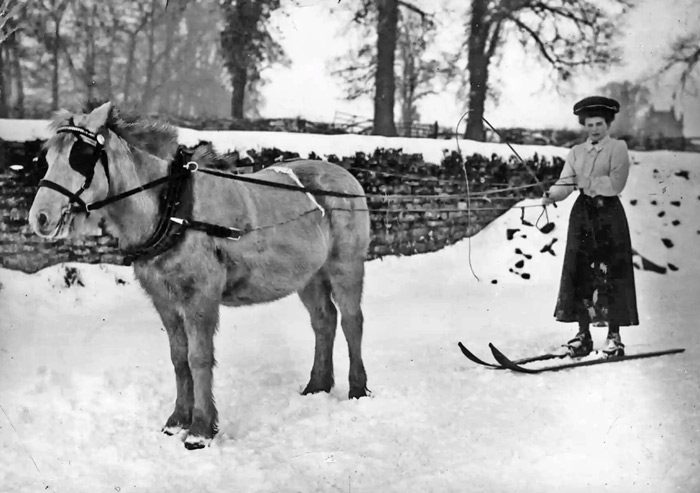 Skiing behind a horse–the ancient Norwegian art of skijoring–in Northampton, England, 1908.
Skiing behind a horse–the ancient Norwegian art of skijoring–in Northampton, England, 1908.
vintage
horse
England
skijoring
1908
Northampton
(Image credit: Topical Press)
Feb 10, 2018
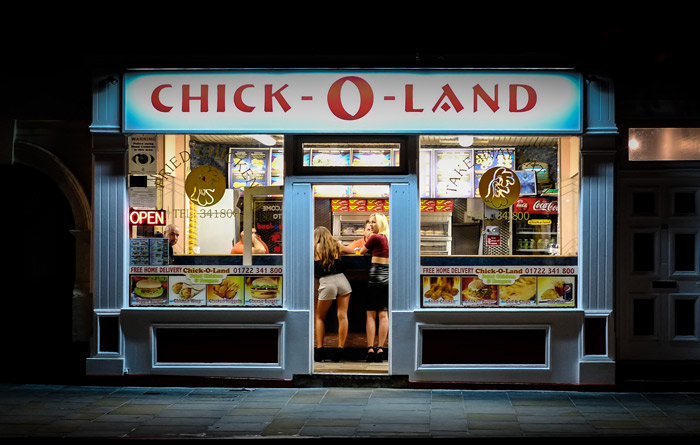
Midnight in Salisbury, United Kingdom. We don't want the world to be quite this way, but it is what it is.
night
streetscape
England
sign
restaurant
women
1913
Salisbury, UK
(Image credit: Nick Palliser via The Image Story)
Mar 22, 2018
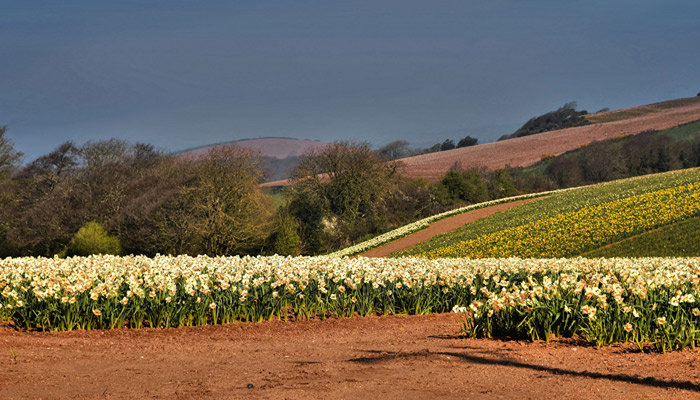 The Cornish daffodil fields produce 90 percent of England's commercial daffodil crop. In my neck of the woods, almost 5,000 miles from Cornwall, daffodils are blooming noncommercially even as we speak.
The Cornish daffodil fields produce 90 percent of England's commercial daffodil crop. In my neck of the woods, almost 5,000 miles from Cornwall, daffodils are blooming noncommercially even as we speak.
Perhaps in your neighborhood they're already fading, or maybe the new tips of their leaves are still hidden in the snow–no matter; spring is trundling on in these days, and if it's early spring, There Will Be Daffodils.
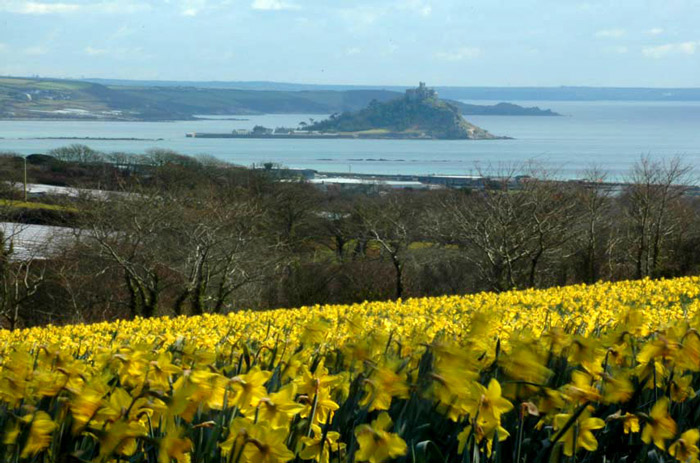
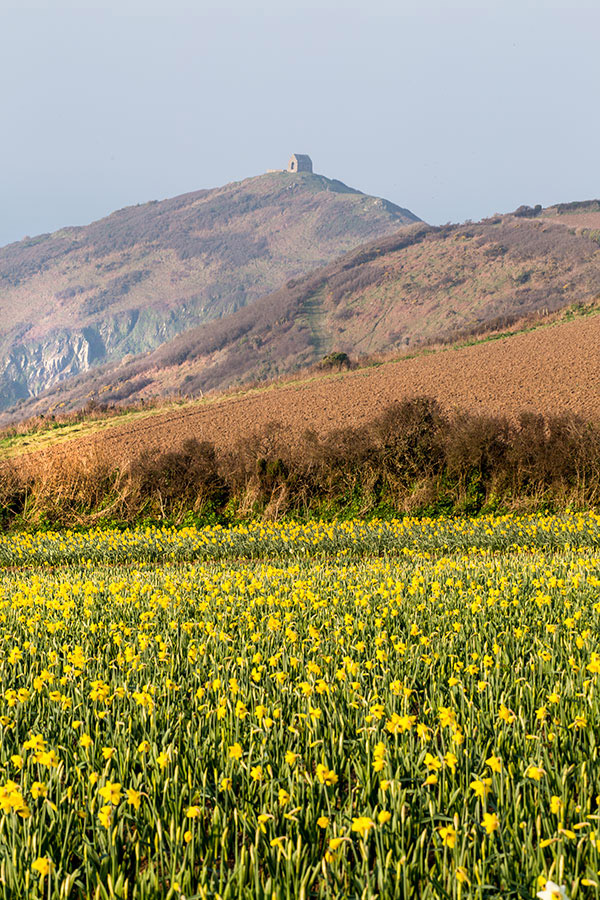
landscape
flowers
England
spring
coast
daffodils
castle
fields
farmland
hills
Cornwall
(Image credits: top, Image1.me; middle, cornwalls.co.uk; bottom, Jim Peters)



 In 1919, when George Thomas was an eight-year-old growing up in the town of Sheffield in northern England, he and his brothers and friends felt they owned the streets of Sheffield and the fields and forests all around. Their parents didn't mind when they wandered off on adventures of their own devising; even at the young age of eight, he often walked six miles to a fishing pond.
In 1919, when George Thomas was an eight-year-old growing up in the town of Sheffield in northern England, he and his brothers and friends felt they owned the streets of Sheffield and the fields and forests all around. Their parents didn't mind when they wandered off on adventures of their own devising; even at the young age of eight, he often walked six miles to a fishing pond.





 It was a thousand and one years ago yesterday that the Viking Cnut (aka Knut, Knud, or Canute) was crowned King of All England.
It was a thousand and one years ago yesterday that the Viking Cnut (aka Knut, Knud, or Canute) was crowned King of All England. 

 The Cornish daffodil fields produce 90 percent of England's commercial daffodil crop. In my neck of the woods, almost 5,000 miles from Cornwall, daffodils are blooming noncommercially even as we speak.
The Cornish daffodil fields produce 90 percent of England's commercial daffodil crop. In my neck of the woods, almost 5,000 miles from Cornwall, daffodils are blooming noncommercially even as we speak.
